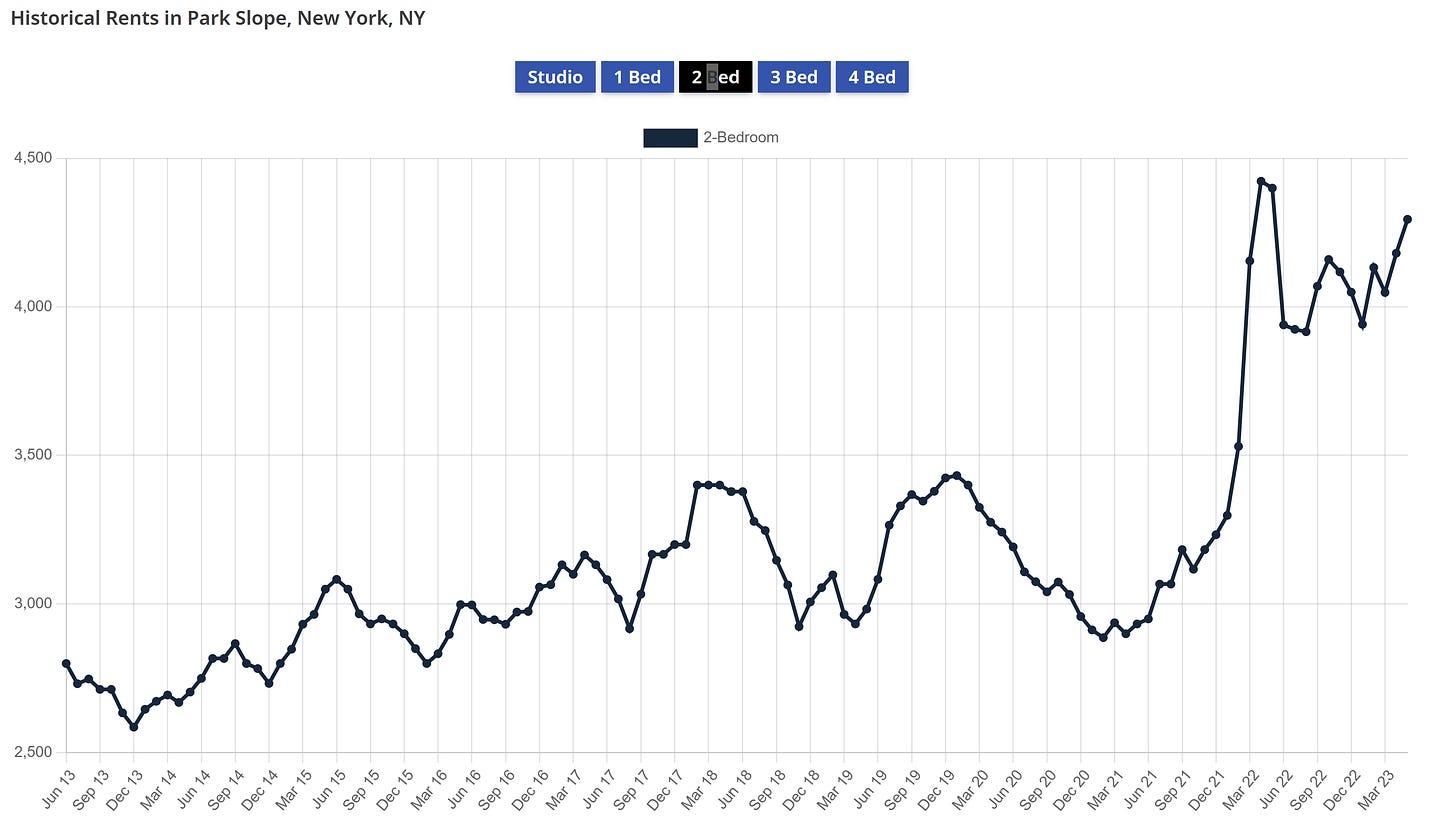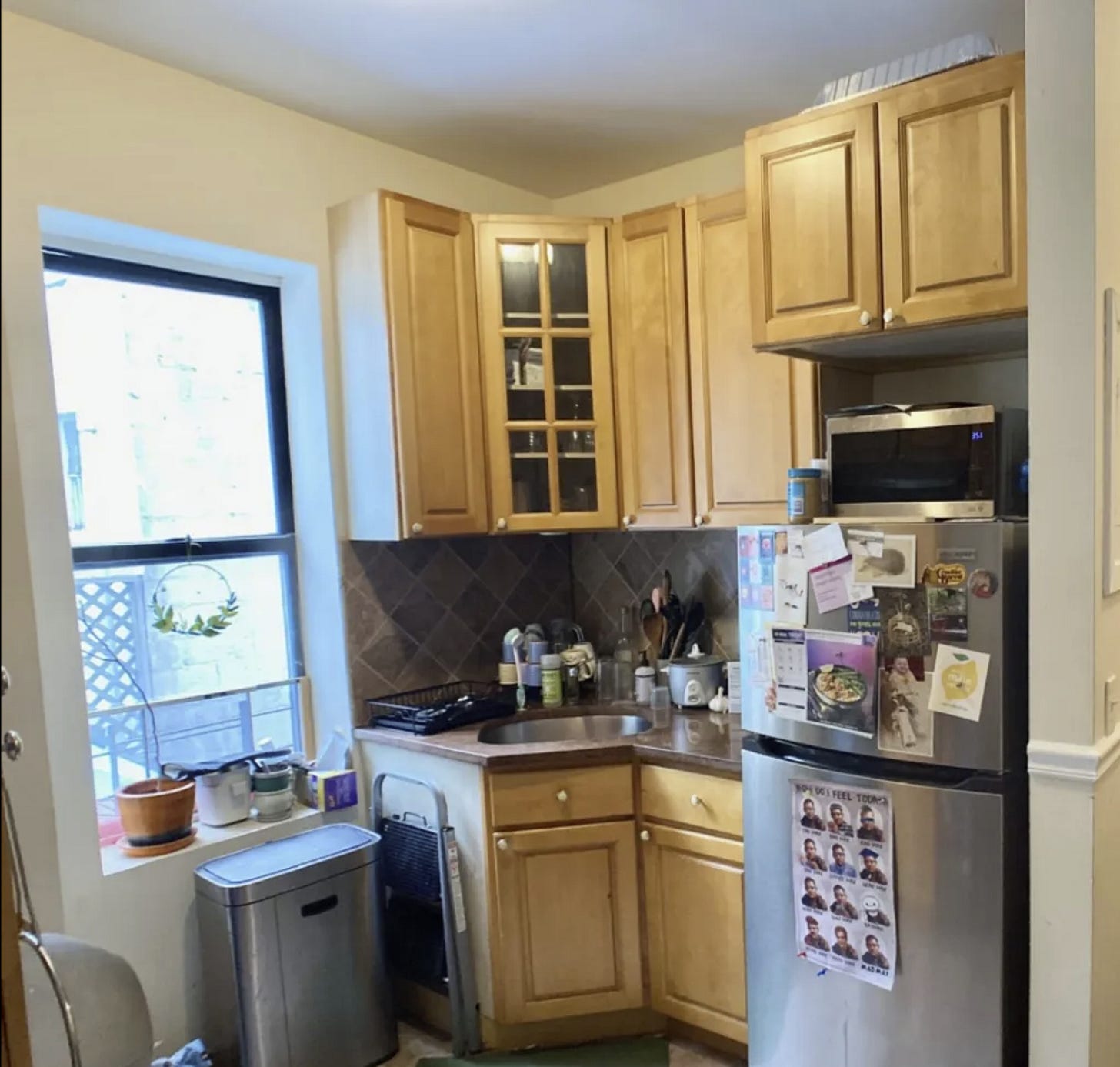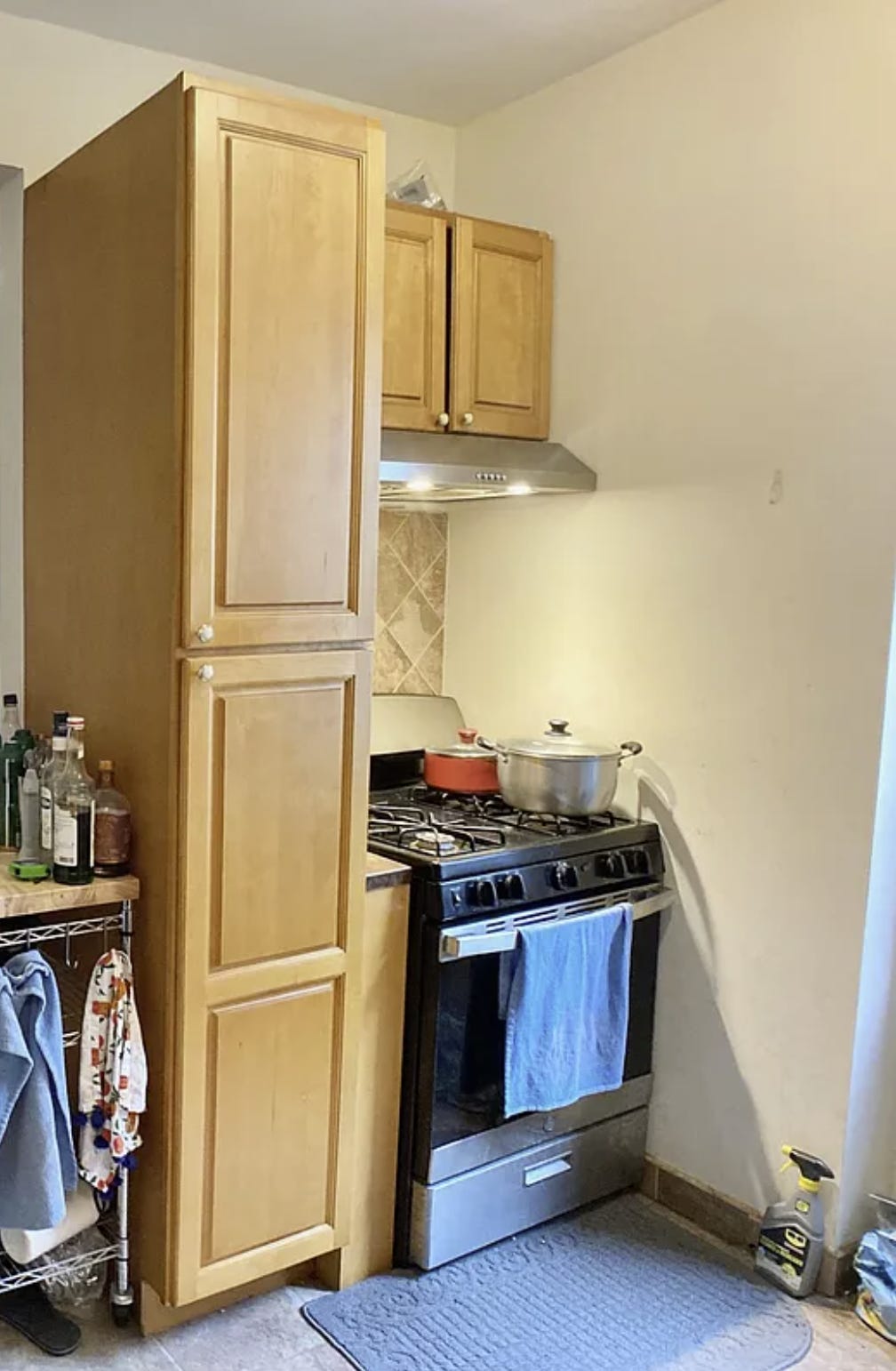Goodbye to "Goodbye to All That"
maybe leaving New York can just be a choice
We got priced out of Brooklyn, more or less. Yes, in a privileged, high-income way. But the simplest way to define why we’re moving is that we got priced out.
We bought a house! We’ve closed, gotten the keys, and moved some stuff in. We’re going to fully move in at the end of June. It’s about two hours from the city in a smallish town. The house is small, as far as these things go, and in a dense neighborhood, but more than enough space for us, and seems huge to a guy who has lived in apartments since he was 18 years old. It especially feels big to have a basement, a garage, a deck, and a yard. A small basement, garage, deck, and yard, but ours, and as much as we need. It also feels big to have a driveway after six months of parking on the street in Brooklyn. I know, owning a car in NYC is a self-inflicted wound, but I had to buy the car to be able to look for a house, and my forays in alternate-side parking have already lost whatever sense of adventure they once had. When I pull into the new house (which I am doing every few days, as we’re doing a month-long gradual move-in), I get this illicit feeling, like owning my own parking spot is some sort of secret ploy that will eventually be found out. We thought that the long move would eliminate the one day of intense stress and give us more time to enjoy Brooklyn before leaving; it turns out that moving over the course of a month simply gives you one month of intense stress, but it is nice to have extra time to say goodbye to the city and borough I’ve called home for the past seven years.
A voice in my head reminds me about the inevitable Discourse here, so look: I know buying a house requires uncommon financial security in our current era, and I know many good people can’t do it. I also think, however, that getting mad at people who do because of the fact that many can’t is a way to take what should be available to everyone and turn it into an elite privilege, which is the opposite of what we should want. And, since we’re talking about money, I should mention that a couple people have said that we’ve bought a house at exactly the wrong time; we’ve got the worst interest rates of my adult lifetime, while home prices have crested and appear to be going down, at least relative to inflation. I’m sure those things are correct, but they reflect a way of looking at a house that I find unfortunate - we bought the house to live in it. I don’t see it as an investment vehicle, and I would be happy if it simply maintained its value in the long run. Hopefully I can refinance when rates come back down, if indeed they do. The bare fact of the matter is that I can afford the mortgage payments comfortably, and it’s a price I’m happy to pay. Both my girlfriend and I have the natural frugality of people who had unstable childhoods, and the total price of the mortgage is exactly half of what I was approved for by the lender. My default assumption in life is always that the floor is about to fall out from under me, and I’ve baked that fear into this decision. Besides, where we’ll be living is much cheaper than New York in many non-housing ways, and the mortgage+insurance+tax bill I’ll pay is not much more than our rent here is now.
This should underline the previously-stated fact that this was, to a considerable degree, a financial decision. I haven’t fallen out of love with the good things in the city. New York is a wonderful place, and Brooklyn is a wonderful place within a wonderful place. That feeling has never changed. I have no big, disgusted, “I wipe my hands of this” declaration to make here. The fact of the matter is that I can live anywhere, with my job, and as time has gone on it’s gotten harder and harder to justify living in such an insanely expensive place. If we could afford a nice townhouse with sufficient space for us in Brooklyn, I’m sure we’d stay. But, well - we can’t. Not even close. And who knows, maybe in ten years we’ll want to move back. But for that to happen (without downsizing to a remarkable degree from this new house, which I doubt I’d want) I’d have to get rich; it would require some serious financial change in my life that goes way beyond simply extrapolating the income growth I’ve enjoyed in the past few years. I don’t see that happening. It should go without saying that this country badly needs sensible zoning and regulatory reform to make new building more cost-effective, as well as public investment in housing of the type that has worked so well in other places.
Yes, we could afford to stay in New York and still live in greater material comfort than most people here. But we couldn’t afford the kind of space we want, again modest compared to most single-family homes but just not attainable in our current neighborhood. The median home price here is literally four times what we paid for our new house, and that includes apartments; the townhouses are all in the multiple millions of dollars. And it’s true that we don’t have to live in Park Slope, which is a pricey neighborhood, but even in cheaper parts of Brooklyn the median home price is twice or more what we paid and the median home significantly smaller and less nice. Plus, just, the things we’ll able to enjoy…. I understand that nobody really needs a yard. But I haven’t enjoyed the feeling of grass under my feet in a place that’s secluded and private since I was a child. It feels good. And yes, I bought that fucking pizza oven that people made fun of me for wanting. I know these are middle-aged desires, but then, I’m a middle-aged man. I know we made the right choice and I’m excited to start our new life.
In the spirit of full disclosure, when we were deliberating whether it was really time to go, I personally became fully committed when I sat down on our toilet and was pelted with objects hitting me in the head from above, which were perched precariously because everything in our apartment is perched precariously because there isn’t room for anything. This was far from the first time it had happened. The moment simply crystallized my feeling that our environment was making me stressed and unhappy, specifically because I was living in a haphazard pile of stuff all the time. The chronic lack of space is something that you think you can easily live with, and for awhile you can, and then at some point you realize that the physical environment around you matters in ways you haven’t really chosen. For me, the fact that the “dining room” table - which occupied a roughly four-foot by eight-foot space in the living room, which also contained a couch, coffee table, shelving unit, stereo system, wooden crate that hid the litter box, cat water bowl, cat food bowl, side table for the modem and router, and television, all in an area that’s smaller than the deck at our new house - the fact that the table was never not completely covered in stuff became a problem for me, subtly, in a way that I can’t quite define but which really got to me over time. We’ve had piles of books on every available surface the entire time we’ve lived here. We look like hoarders despite constantly working to minimize and get rid of stuff. I don’t know, I just want more space. I just do.
And, yeah, that’s “space” defined liberally, not just in terms of square footage in our dwelling. Most problems with cities are geometry problems - geometry, not geography. How do you fit so much stuff, and so many people, into such a small space? As I suggested above, there are things New York (and many other cities) could do to improve its housing affordability problem. But fundamentally you have this essential issue that a certain mass of humanity wants to live in a land area that isn’t getting any bigger. (Yes, I’m aware that many places in the world have much higher population density.) This bleeds out into everything. For example, the food markets in Brooklyn. They have admirable selection, especially given their size. But to have that admirable selection, given space constraints, the aisles have to be very narrow. In a sense, this is a tiny little thing. But I’ve had seven years of having to awkwardly maneuver by someone who’s stooped to look at tomato sauce, and the proximity is uncomfortable even when you don’t physically touch, which you often do. This is a microcosm of the city writ large; you spend so much of your time having to negotiate space with strangers, some of whom have no interest in accommodating you.
There’s no parking, and the streets are constantly clogged, and the sidewalks are filled with delivery drivers on scooters and electric bicycles who seem absolutely intent on mowing someone down someday, and in the summers people arrive at the beach at 6 AM to claim a bit of space on the sand, and the subway is always an exercise in getting to know a fellow passenger’s preferred cologne, and you can go to a restaurant on a random Tuesday at 5 PM and discover that you should have made a reservation, and on a nice day the parks are filled to the point that you can’t find a place to put a blanket the size of a postage stamp…. I say all this as a human being who loves other human beings, sincerely. But I’m exhausted by feeling cramped. New York is all sorts of wonderful things and experiences, but it’s also FDR Drive in rush hour.
Here’s the kitchen of our current place.
To give you a sense of the scale, if I place my feet flat against the cupboard next to the refrigerator there, I’m not able to lay flat on my back but instead have to lean up against the pantry. That’s how narrow the space is. And that is indeed the only stretch of counter in the whole place. My girlfriend is an excellent chef, and I like to cook once in awhile, but we find we eat out or get delivery way more often than we intend to because trying to operate in that tiny space is such a drag. That bar cart was supposed to function as mobile extra counter space, but like everything else in our home it became a kind of storage container. I don’t know, man. I guess these are first-world problems. But I just can’t deal anymore. So we’re leaving. And, for the record, they just put the place on the market for $3,000 a month, and somebody’s going to consider it a steal.
I can fit in the new tub. I can actually fit.
Joan Didion’s classic essay “Goodbye to All That” was published in 1967. Its title is taken from an autobiography by the Irish writer Robert Graves, who wrote the classic historical novel I, Claudius. In it, Didion details why she once loved New York and, in time, became disillusioned and chose to leave. It’s far from my favorite Didion, but it demonstrates her unique verve very well, and it does capture something about the strained and demoralizing pretenses of the city even now, though it describes a New York that’s some 60ish years old. The essay itself, but more the sensations it describes - exhaustion, disillusionment, slowly-building disdain - are sufficiently perennial that a book of essays was published in 2013, with the collected works riffing on Didion’s essay and its subject matter. I actually quite like the collection, mostly, but its existence speaks to the (equally perennial, equally exhausting) sense that New York is not a place one lives in or leaves but an ideology that you embody or reject. (Relevant to our purposes here is the fact that a companion volume to that essay collection was also published, written by those who were sure they would never leave.) What I’m here to suggest today is that perhaps this condition is not universal; perhaps a writer moving out of New York is not necessarily someone making a bold statement about what truly matters in life but could be, instead, simply the quotidian decision of a tired 41-year-old with a patient and accommodating partner, a constant fear of imminent financial ruin and a concomitant desire to live more cheaply, and the unrealized hope for a child. Maybe leaving can just be a choice.
The thing about New York is that it’s wonderful and also very hard. There’s a glaring downside to go with every advantage. This is, I think, why there’s so much constant self-mythologizing by people who live here - it’s hard enough that you have to talk yourself into it all the time. Recent transplants are forever mooning on about how incredible New York is, about how “real” the people are and such, and to me it’s always transparently the case that they’ve been slapped in the face by the city a little bit and are overcompensating. People who’ve been here a lot longer and feel more secure as residents are much more willing to admit that, sometimes, this city can really fucking suck. I think the endlessly stupid bodega discourse is a vestige of this phenomenon. The people who are trying so hard to convince you that there’s really, truly a difference between the relationship they have with their “bodega guy” and the relationship someone has with the 7/11 employee they see every day in their New Jersey suburb…. I think this is a vestige of New York being almost uniquely demoralizing, at times. So people come up with all of this extra credit romanticized shit to offset the fact that they stepped in human excrement last week, that if they ask their landlord to fix a leak they’ll get put on some sort of blacklist, and that an extra value meal costs $17. This romanticism, as I’ve said before, is not necessarily out of line; certainly it’s understandable. It is, however, a big part of why many people from other places find New Yorkers insufferable.
Look: I’m an incorrigible romantic. I find New York romantic, in a way that’s quite incorrigible. I would never want to lose my sense of love and wonder for the city. I don’t want you to lose yours, either. All I’m saying here is that, to me, the difference between moving to the other side of the park (as I did a few years ago) and moving a couple hours away is not really as vast as people might think. It’s mostly a calculation about the fact that so many of the good things about New York are things that we don’t do at all anymore, like going to bars, or don’t do nearly as much as we used to, like going to museums. And since our new place is within walking distance of a train station from which we can take a very pleasant journey into the city, enabling us to take day trips whenever we want, the bigger-ticket attractions like concerts and baseball games and the Met will still be available to us, just as often as we actually do them as city dwellers now. It’s also the case that the availability of food and drink that was once restricted to big cities has expanded to smaller places dramatically in the past several decades, though there will never be any matching the dining options once available to us. But that’s life. There’s tradeoffs to everything.
I know I’ll miss Brooklyn terribly. I’ll especially miss taking daily walks in my beloved Prospect Park. But I have to tell you, when we get to the new house and I stand on the porch and feel the quiet, and then I can just throw a box of stuff in the basement wherever I’d like, it feels like I’ve taken off a tight shoe. And I’d like to be in that era in my life, the era of taking off tight shoes.





just ordered a medium pizza and a side of calamari for $22 in the new town btw
Congratulations! And a word of advice from someone who followed a similar path: "stuff" tends to expand to fill all available space, so if you want to keep enjoying that wonderful feeling of having more than enough room, you really need to stay vigilant in the constant battle against clutter.